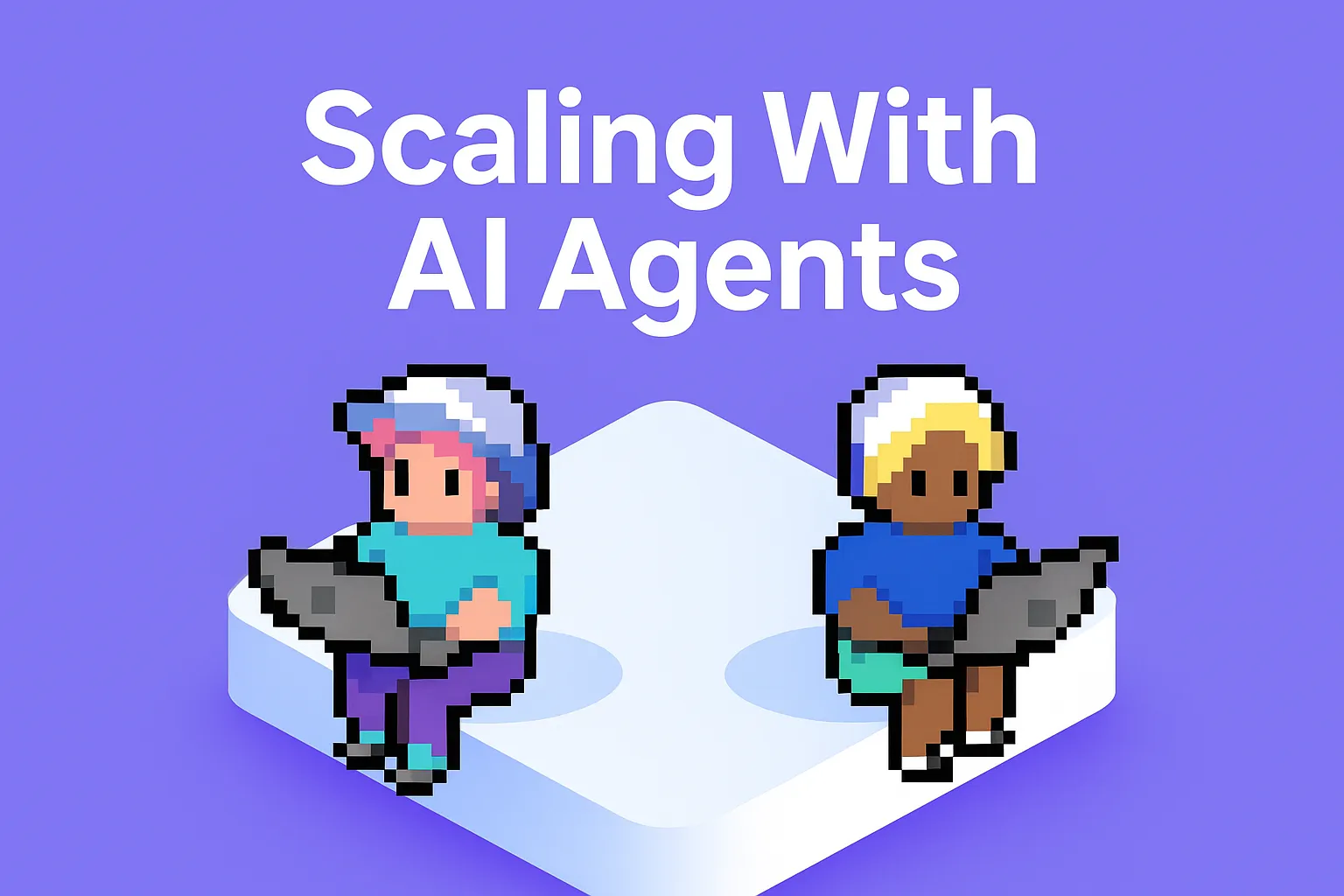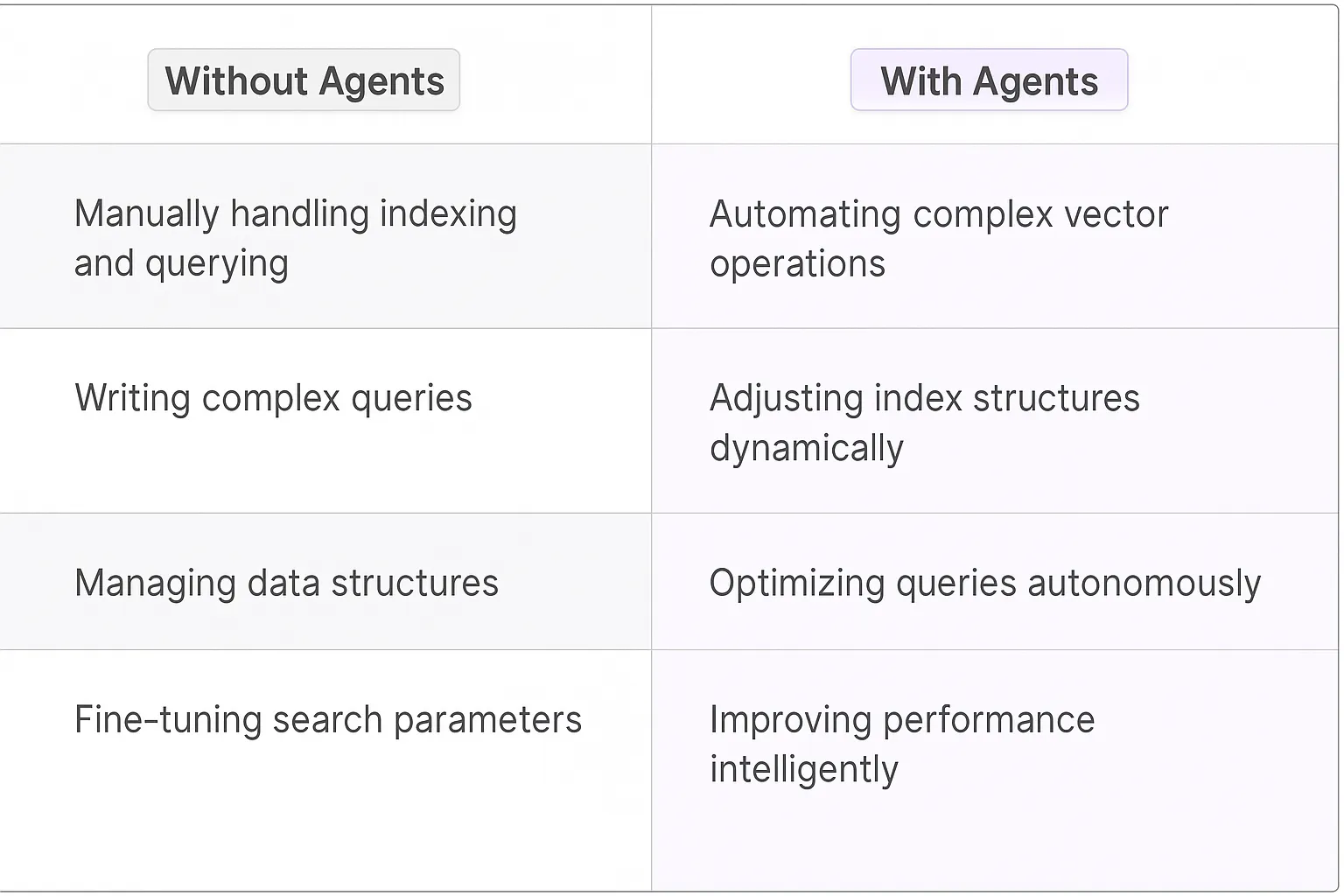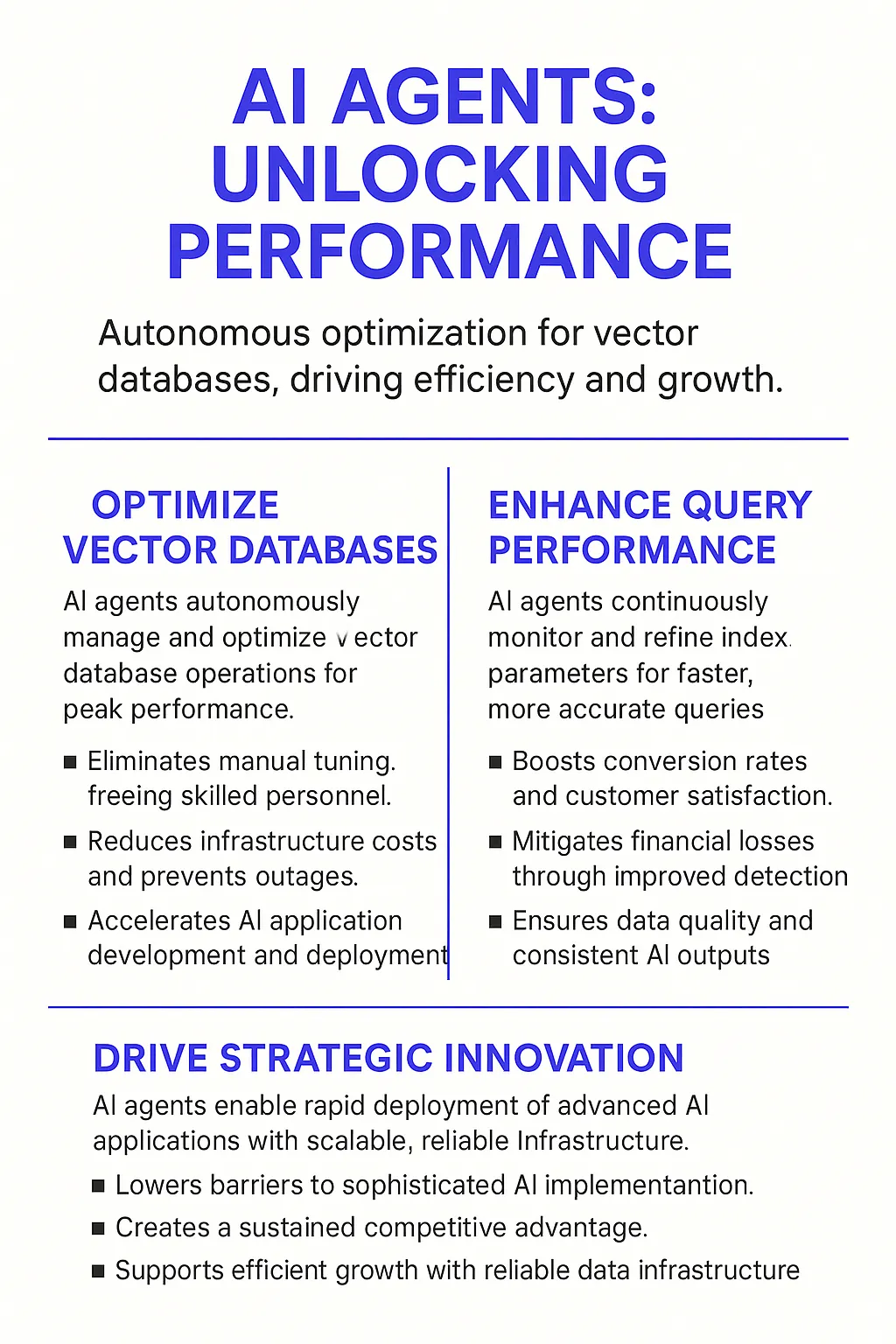Pinecone
Understanding Pinecone's Vector Database Platform
Pinecone stands as a vector database platform that specializes in similarity search and vector operations at scale. The platform excels at managing high-dimensional data representations, enabling organizations to build sophisticated AI applications that require semantic search capabilities. When combined with AI Agents, Pinecone transforms into an intelligent system that can autonomously handle complex vector operations while continuously optimizing performance.

Benefits of AI Agents for Pinecone
What would have been used before AI Agents?
Traditional vector database management required developers to manually handle indexing, querying, and optimization. Teams spent countless hours writing complex queries, managing data structures, and fine-tuning search parameters. The process was tedious, error-prone, and often resulted in suboptimal performance. Developers had to rely on basic similarity search algorithms that couldn't scale effectively with large datasets.
What are the benefits of AI Agents?
AI Agents transform vector database operations by bringing intelligence and automation to Pinecone's core functionality. These digital teammates handle complex vector operations autonomously, dynamically adjusting index structures and query parameters based on usage patterns and data characteristics.
The real power emerges in how AI Agents optimize vector similarity searches in real-time. They automatically identify the most efficient index structures, select optimal distance metrics, and adjust dimensionality reduction parameters - tasks that previously required extensive human expertise and trial-and-error.
For machine learning workflows, AI Agents excel at:
- Automatically clustering and categorizing high-dimensional data points
- Detecting and adapting to data distribution changes
- Optimizing query performance through intelligent caching and routing
- Managing index updates while maintaining search quality
The network effects are particularly compelling - as more organizations use AI Agents with Pinecone, the agents learn from collective usage patterns to deliver increasingly sophisticated optimizations. This creates a powerful flywheel effect where each interaction improves the system's overall intelligence.
From a growth perspective, AI Agents dramatically lower the barrier to entry for teams wanting to implement vector search capabilities. They eliminate the need for specialized expertise in vector database optimization, allowing organizations to focus on building applications rather than managing infrastructure.

Potential Use Cases of AI Agents with Pinecone
Processes
Vector database management becomes exponentially more powerful when AI agents handle the heavy lifting. These digital teammates can continuously monitor and optimize vector indexes, ensuring peak performance without manual intervention. They excel at identifying data distribution patterns and automatically adjusting index parameters for optimal retrieval speeds.
AI agents transform how teams work with semantic search implementations by managing the entire pipeline - from data preprocessing to embedding generation and index maintenance. They can detect and flag anomalies in embedding quality, suggest index restructuring when performance degrades, and maintain consistent vector representations across different data sources.
Tasks
The granular work of vector database operations benefits significantly from AI agent capabilities:
- Real-time index optimization - Agents monitor query patterns and automatically tune index parameters for better performance
- Data quality management - Continuous validation of vector embeddings, identifying outliers and inconsistencies that could impact search quality
- Automated scaling - Dynamic adjustment of resource allocation based on usage patterns and performance metrics
- Query optimization - Analysis of search patterns to suggest improvements in vector representation and similarity metrics
- Cross-collection management - Coordinating vector representations across multiple collections while maintaining consistency
- Performance monitoring - Tracking and reporting on key metrics like query latency, recall accuracy, and resource utilization
When scaled across large enterprises, these AI-powered workflows create compounding efficiency gains. Teams can focus on strategic decisions while their digital teammates handle the intricate details of vector database operations. The result is a more robust and reliable semantic search infrastructure that grows smarter over time.
The combination of AI agents and Pinecone's vector database capabilities opens up new possibilities for building sophisticated AI applications. As these systems evolve, they'll enable increasingly complex use cases in areas like personalization, anomaly detection, and real-time recommendation systems.

Industry Use Cases
Pinecone AI agents are transforming how businesses handle complex data operations and vector search capabilities. The real power lies in their ability to process, analyze, and retrieve information at scale - something that traditional databases simply can't match. I've seen firsthand how companies deploy these digital teammates across different sectors, each finding unique ways to leverage vector embeddings and similarity search.
What makes Pinecone's implementation particularly fascinating is how it bridges the gap between raw data and actionable intelligence. Through vector similarity search, these AI agents can understand context and nuance in ways that keyword-based systems never could. When you combine this with real-time indexing and retrieval, you get capabilities that fundamentally change how organizations operate.
The applications span far beyond basic search functionality. From e-commerce platforms using AI agents to power personalized product recommendations, to financial institutions detecting fraud patterns in real-time, to healthcare providers analyzing medical imaging data - each industry has found ways to harness these capabilities for specific, high-value use cases.
E-commerce Product Discovery with Pinecone AI Agents
The e-commerce landscape faces a critical challenge: connecting shoppers with exactly what they want among millions of products. Traditional keyword search and basic recommendation engines fall short, leading to frustrated customers and lost sales. Pinecone AI Agents transform this dynamic through sophisticated vector search capabilities.
A digital teammate powered by Pinecone can analyze product images, descriptions, customer reviews, and historical shopping patterns in real-time. When a shopper searches for "boho summer dress with pockets," the AI agent understands the semantic meaning behind these terms rather than just matching keywords. It identifies visual elements like patterns and silhouettes from product images while factoring in seasonality, current trends, and the shopper's style preferences.
The technical magic happens as Pinecone converts all these data points into high-dimensional vectors, creating a rich understanding of each product. As shoppers interact with items, the AI agent continuously refines its recommendations, learning subtle preferences like fabric choices or fit preferences that customers may not explicitly state.
Major retailers implementing Pinecone AI Agents have seen 30-40% increases in conversion rates compared to traditional search methods. The system excels at surfacing relevant products even when shoppers use natural language descriptions or upload inspiration photos rather than specific product names.
Beyond individual product recommendations, these AI agents analyze inventory patterns, trending searches, and purchase behaviors across the entire customer base. This creates a feedback loop that helps retailers make smarter purchasing and merchandising decisions while delivering increasingly personalized shopping experiences.
Financial Fraud Detection Through Vector Intelligence
The financial services industry loses billions annually to sophisticated fraud schemes that evolve faster than traditional rule-based detection systems can adapt. Pinecone AI Agents bring a quantum leap in fraud prevention by analyzing complex patterns across vast transaction datasets in milliseconds.
When integrated into a bank's security infrastructure, these digital teammates process hundreds of data points per transaction - from geolocation and device fingerprints to spending patterns and account behaviors. The vector database converts these signals into high-dimensional mathematical representations, allowing the AI to spot subtle fraud indicators that rules-based systems miss.
A key advantage emerges from Pinecone's ability to identify "nearest neighbor" patterns. If a transaction shares suspicious similarities with known fraud cases, even if it doesn't trigger standard alerts, the AI flags it for review. This vector-based approach catches fraud rings using stolen credentials across multiple accounts or sophisticated money laundering schemes hiding behind seemingly legitimate transactions.
The results speak volumes: Financial institutions using Pinecone-powered fraud detection report catching 2.5x more fraudulent transactions while reducing false positives by 60%. The system excels at adapting to new fraud tactics in real-time, learning from each confirmed case to strengthen future detection.
Beyond just flagging suspicious activity, these AI agents provide rich context for investigation teams. They surface relevant historical cases, highlight specific risk factors, and even predict potential fraud evolution patterns. This intelligence helps banks stay ahead of criminals while maintaining smooth experiences for legitimate customers.
The technology's impact extends beyond direct fraud prevention. By analyzing patterns in legitimate transactions, banks gain deeper insights into customer segments and behaviors, enabling more personalized financial services while maintaining robust security.
Considerations and Challenges
Implementing Pinecone AI agents requires careful planning and understanding of several critical factors that can impact success. The complexity of vector database integration with AI systems demands both technical expertise and strategic thinking.
Technical Challenges
Vector dimensionality poses a significant hurdle when setting up Pinecone agents. Choosing the optimal dimension size directly affects search accuracy and performance. Too many dimensions can lead to the curse of dimensionality, while too few may result in loss of important information.
Index management becomes increasingly complex as data volumes grow. Organizations must carefully balance index size with query performance, considering factors like pod scaling and memory allocation. The choice between metadata filtering and hybrid search can dramatically impact response times.
Data preprocessing and vector encoding consistency are critical yet often overlooked aspects. Ensuring all embeddings use the same encoding model and preprocessing steps prevents data drift and maintains search relevance over time.
Operational Challenges
Cost optimization requires careful attention to index size and query patterns. Each index consumes resources differently, and understanding usage patterns helps prevent unnecessary expenses. Organizations need strategies for managing cold vs. hot data to balance performance and cost.
Data freshness and update frequency present ongoing operational concerns. Teams must establish clear protocols for updating vectors and handling real-time data changes while maintaining system performance.
Monitoring and observability become more complex with distributed vector search systems. Teams need robust logging and monitoring solutions to track search quality, latency spikes, and system health across multiple pods and regions.
Security and access control requirements add another layer of complexity. Organizations must implement proper authentication mechanisms while ensuring they don't significantly impact query performance or user experience.
Democratizing Vector Search Through AI Integration
The integration of AI Agents with Pinecone's vector database technology marks a significant shift in how organizations manage and leverage vector search capabilities. This combination removes traditional barriers to entry, enabling teams to focus on building applications rather than managing complex infrastructure. As these systems continue to evolve and learn from collective usage patterns, they create powerful network effects that benefit the entire ecosystem. The real value lies not just in the technical capabilities, but in how this technology democratizes access to sophisticated vector search operations, opening new possibilities across industries.













